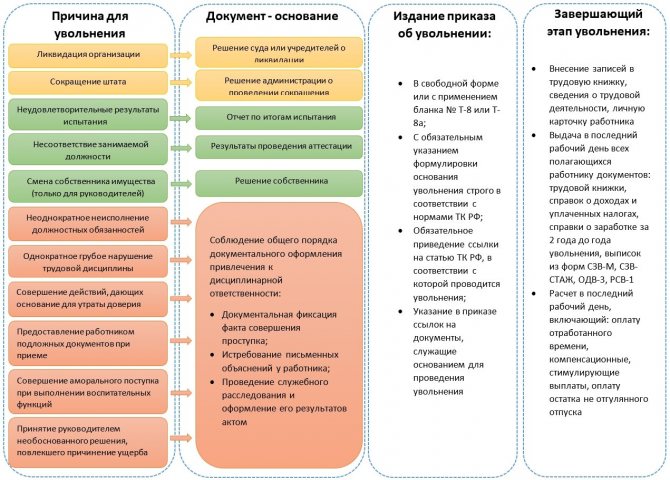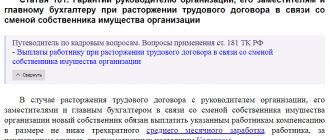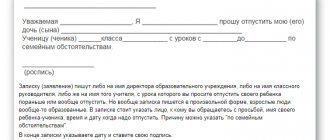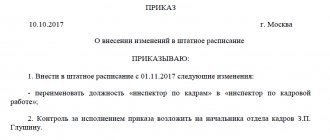Termination of an employment contract at the initiative of the employer and payment of compensation
Situation
The organization, starting October 16, 2021, dismisses an employee due to job reduction (clause 1, article 42 of the Labor Code of the Republic of Belarus). He is paid an allowance in the amount of 3 months' earnings. The employee agrees with the partial replacement of the warning with monetary compensation (in proportion to the time remaining before the end of the 2-month warning period - 1 month).
Data for calculation
In August, the employee worked a full month (23 working days) and received a salary of 360 rubles. In September, the salary was 274 rubles, 16 out of 21 working days were worked. The remaining days in September the employee was sick. The amount of temporary disability benefits is 50 rubles.
The current tariff rate of the 1st category in the organization did not change during the period under review.
Calculation
Step 1
Determine the period based on which compensation related to replacing the employee’s notice of layoff is calculated. Compensation must be paid no later than the day of dismissal, i.e. in October. This means that the period for calculation is from August 1 to September 30, 2017.
Step 2
Determine the average daily earnings, taking into account the time actually worked by the employee:
– for August: 360 rub. / 23 days = 15.65 rubles;
– for September: 274 / 16 = 17.13 rubles.
Step 3
Determine the amount of wages by multiplying the average daily earnings calculated for each month separately by the number of working days in it, provided for by the organization’s work schedule:
– for August: 15.65 rubles. × 23 days = 360 rubles;
– for September: 17.13 rubles. × 21 = 359.73 rub.
Step 4
Determine the average monthly earnings for the specified period by dividing the amount of wages for these months by 2:
(360 + 359.73) / 2 = 359.87 rub.
Thus, the amount of compensation for partial replacement of the warning will be 359.87 rubles.
The amount of severance pay in the amount of 3 times the average monthly earnings is equal to 1,079.61 rubles. (359.87 × 3).
Expert commentary
Please note the following points:
1) an employment contract for an indefinite period, as well as a fixed-term employment contract, can be terminated by the employer before the expiration of the term, in particular, in the event of liquidation of the organization, reduction in the number or staff of employees.
Upon termination of an employment contract in connection with the liquidation of an organization, cessation of the activities of a branch, representative office or other separate division of the organization located in another locality, the implementation of measures to reduce the number or staff of employees, termination of the activities of an individual entrepreneur, severance pay is paid in the amount of at least 3 times the average monthly salary earnings.
When terminating an employment contract on this basis, the employer is obliged to notify the employee in writing of the upcoming dismissal at least 2 months before dismissal, unless a longer period is provided for in the collective bargaining agreement or agreement.
The employer has the right, with the consent of the employee, to replace the warning of impending dismissal with payment of compensation in the amount of 2 months' average earnings. Moreover, if the initiative to reach such an agreement comes from the employer after warning the employee about the upcoming dismissal, compensation is paid in proportion to the time remaining before the end of the 2-month warning period.
Thus, the total amount of payments to an employee upon dismissal can be at least 5 times the average salary. In our case, this is 4 times the average earnings: compensation was paid in the amount of 1 month’s average earnings, since there was 1 month left before the end of the 2-month warning period;
2) upon dismissal of an employee, all payments due to him from the employer on the day of dismissal are made no later than the day of dismissal. In the event of a dispute about the amount of payments due to an employee upon dismissal, the employer is obliged to pay the amount not disputed by him on the day of dismissal;
3) average earnings to determine the amount of the specified compensation are calculated based on the wages accrued to the employee for 2 calendar months of work (from the 1st to the 1st day) preceding the month of payment of compensation, taking into account the features provided for in Chapter. 3 of Instruction No. 47. Average monthly earnings are calculated by dividing the amount of wages accrued to the employee for the period adopted in this case by 2. If in the 2 months accepted for calculating average earnings, the employee did not work all working days in accordance with the PVTR or the approved work schedule ( shifts), wages for each month are determined by multiplying the average daily (average hourly) earnings calculated for each month separately in the manner established by Instruction No. 47 by the number of working days (hours) provided for by the PVTR or the approved work schedule (shift) of the employee, and dividing the amount of wages received for these months by 2;
4) if the employee, in the period adopted for calculating average earnings, in accordance with the law, did not actually work for part of the days (hours) (vacation, temporary disability, performance of state or public duties, downtime not through the fault of the employee, in other cases when the employee average earnings are preserved in accordance with the law), average earnings are calculated without taking into account the specified days (hours) and the amounts paid for these days (hours). Thus, the amount of the benefit, as well as the days of temporary disability themselves, are excluded from the calculation.
Rationale:
1) clause 1 art. 42, art. 48, part five art. 43, art. 77 of the Labor Code of the Republic of Belarus;
2) pp. 18, 22 and 25 of the Instructions on the procedure for calculating average earnings maintained in cases provided for by law, approved by Resolution of the Ministry of Labor of the Republic of Belarus dated April 10, 2000 No. 47.
Nina Anishchenko, expert of the magazine "Chief Accountant"
Does the employer have the right not to renew the agreement?
The clear answer to this question is: yes, it does. This is stated, for example, in Art. 79 Labor Code of the Russian Federation. Based on its provisions, we can conclude: even if the employee is satisfied with everything, the head of the organization has the right not to renew the contract. Consequently, the agreement will be terminated. Let's consider the issue in more detail.
Grounds for dismissal
From the point of view of the legislation of the Russian Federation, the reasons for dismissal may be the following (Article 79 of the Labor Code of the Russian Federation):
- expiration of the contract;
- the return to work of a new employee who was absent for one reason or another, but was not fired;
- the end of certain work or season.
In most cases, except for replacement situations, the employer must notify the employee that the contract is coming to an end.
Attention! The highest courts of the Russian Federation do not consider such a notice to be a notice of dismissal.
But, in essence, it expresses the will of the employer for the employee to leave. Moreover, if the employee does not receive such notice of dismissal, it will be considered that the contract is renewed for an indefinite period.
Termination of a working relationship early
Unfortunately for employees, during the term of the agreement with the employer, one cannot relax, because a fixed-term contract, like an open-ended one, can be terminated at the initiative of the employer if certain circumstances occur. They are listed in Art. 81 Labor Code of the Russian Federation. In particular:
- liquidation;
- reduction;
- violation of discipline by an employee (how dismissal will occur for this reason, read here);
- disclosure of secrets;
- theft and others.
The list is not exhaustive. The article states that early termination of a temporary employment contract at the initiative of the employer can be carried out in cases provided for by current legislation (in which cases a person can legally be fired from work and what the procedure for this dismissal will be, read here).
It is important to remember that there are exceptions to the general rule. So, by virtue of Art. 261 of the Labor Code of the Russian Federation, an employer cannot terminate a fixed-term employment contract with a pregnant woman until childbirth occurs.
Certain guarantees have been established for single mothers, parents with many children, and mothers raising disabled children. However, in some cases, employees and employees from these categories can be fired. In particular, for violation of discipline or during the liquidation of an organization.
Thus, the provisions of Articles 79 and 81 of the Labor Code of the Russian Federation allow the termination of a fixed-term employment contract at the initiative of the employer, both in connection with the expiration of its validity period, and ahead of schedule.
What are the consequences for a manager for violating labor laws?
Dismissal at the initiative of the employer is the most frequently contested. If the parties have entered into an agreement or the employee independently decides to leave the workplace, significantly fewer problems and conflicts arise.
In case of violation of labor legislation and infringement of the employee’s interests, the injured person may appeal to the following authorities:
- trade union;
- labor inspection;
- court;
- prosecutor's office
Most often they go to court and the labor inspectorate.
As a result of such statements, the following consequences are possible for the employer:
- unscheduled inspections;
- reinstatement of a dismissed employee;
- compensation for moral damage;
- payment of average earnings during the employee’s forced suspension;
- deprivation of the right to engage in activities and disqualification for repeated violations of the law.
Expert opinion
Irina Vasilyeva
Civil law expert
All measures are applied individually and in different combinations. It all depends on the specifics of the case, the nature of the claim and the amount of evidence presented by the parties.
Expert point of view on the issue of payments for unspent regular vacation
In the next letter No. 14-1/B-1074 dated October 28, 2016, the Ministry of Labor explains that compensation upon dismissal for unspent days of the next vacation is calculated for the entire time of work for one employer. Essentially, this is the difference between the number of days accumulated before dismissal and the days used, which the dismissed person has already “taken off”.
The Ministry of Labor draws attention to the fact that the calculation of the length of service, which gives the right to receive such compensation, is carried out taking into account the norms of the Rules on vacations of labor and employment of the USSR dated April 30, 1930, insofar as it does not conflict with the Labor Code of the Russian Federation (Article 423).
The amount to be paid is calculated in proportion to the time worked. This rule applies to employees resigning at their own request who have worked for one employer from 5 and a half to 11 months. When working for 11 months, the dismissed employee is paid in full.
Regarding the use of rounding when determining work periods, the following is noted. Excess that does not reach the middle of the month should be excluded from the calculation. If the excess reaches the middle, then it is rounded up to the whole month. This explanation is supported by a specific example. So, an employee worked in one place for 10 months and 20 days. Taking into account the above rules, the twenty-day period is rounded up to a whole month. Accordingly, the length of service of a citizen upon dismissal to determine compensation for spent paid vacation is 11 months. This means that the fired person will be paid the full amount.
The author of this letter is M. S. Maslova, the author’s position is Director of the Department of Remuneration, Labor Relations and Social Partnership of the Ministry of Labor of the Russian Federation.
Example 1. Wrongful dismissal for absenteeism
S. N. Sokolova worked at Proekt LLC as a leading specialist. The employer transferred her to another lower position without the employee’s consent. S.N. Sokolova perceived these actions as unlawful and did not go to work. Then she was fired for absenteeism.
An employee can defend her interests in court by filing a statement of claim with a request to be reinstated in her previous position (leading specialist). The translation was carried out in violation of legal norms, without the written consent of S. N. Sokolova. Moreover, her refusal to work would not be a violation of discipline.
Example 2: Wrongful dismissal due to lack of qualifications
S.R. Lunnik was fired under Art. 81, part 3 (inconsistency with the position held). There is no documentary evidence or facts of inconsistency. As evidence of insufficient qualifications in such a situation, the following could be used: certification results, orders for penalties for failure to fulfill official duties, lack of education, etc.
The employer was guided in making this decision only by his own general impression. Therefore, the dismissal is illegal. S. R. Lunnik has the right to appeal the decision through the court and demand reinstatement at work.
How to terminate correctly from a legal point of view?
Much depends on the foundation. If the circumstances provided for in Art. 79 of the Labor Code of the Russian Federation, for example, when the season or the term of the agreement ends, the employer must send the employee a corresponding notice.
A few important points:
- The notice must be prepared in writing. There is no set form. But any lawyer, in principle, can competently prepare a document. For example: “I notify you that the term of fixed-term employment contract No. 555 dated May 25, 2021, concluded between Lily of the Valley LLC and you, Pyotr Yuryevich Smirnov,” expires on May 10, 2021.
We inform you that Landysh LLC does not plan to extend the term of the employment relationship and intends to terminate the specified agreement on May 11, 2018.”Like that.
- Notice must be given to the employee at least three days before the contract expires.
- If the document is delivered in person, it is advisable for the employee to sign for receipt on its copy.
Recommendation. If a letter is sent, it must be registered, with a notification and a description of the attachment.
If the reason is different, then you need to follow the procedure provided for by the Labor Code of the Russian Federation. For example, if there was absenteeism, then it is necessary to conduct an inspection, draw up an appropriate report, and take explanations from the employee. If liquidation of the organization is planned, employees are notified of this within the appropriate time frame.
Drawing up orders and filling out personnel documents
The order is issued according to the general rules. It is most convenient to take the T-8 form as a basis. It is important to fully state the reason for dismissal in the document and refer to the relevant article. For example: “Expiration of the employment contract, paragraph 2 of part one of Article 77 of the Labor Code of the Russian Federation.” If an employee was caught absenteeism, then the grounds and the article will naturally be different.
A similar entry is made in the work book. The last section of the personal card is filled out (form T-2). All documents are issued to the employee on the day of dismissal. All funds due must be transferred on the same day.
In order to avoid various claims and unnecessary proceedings from former employees in the future, the dismissal procedure at the initiative of the employer must be carried out competently. From the special publications of our experts, you will learn how, in accordance with the Labor Code of the Russian Federation, to dismiss the following categories at the initiative of the employer:
- disabled people;
- part-time employees;
- employees on probation;
- pensioners.
General procedure for terminating an employment relationship at the request of the employer
Dismissal of an employee at the initiative of the employer can only be carried out:
- in strict compliance with the requirements and rules contained in the Labor Code of the Russian Federation;
- if there are sufficient and documented grounds for this.
An unjustified or carelessly executed separation at the request of the employer may cause disputes with the departing employee.
In general, the process of terminating an employment relationship is the same for all cases and differs only in the composition of the procedures and documents at the preparatory stage. But it is precisely this that is most important, since at this moment an evidence base is collected that subsequently confirms the validity of the decision made by the company administration.

Important
If legal proceedings arise with a dismissed employee, it is the employer who will have to justify the legality of his actions.
After receiving documents justifying the decision to dismiss, an appropriate order is issued. The employee gets acquainted with him under his signature.
If it is impossible to acquaint the dismissed person with him due to absence for any reason, an appropriate note is made in it.
Then they enter information about the dismissal into the work book and the register of information about labor activity, as well as a personal card.
On the last working day, the employee receives all documents related to his work and a full payroll.
Features of dismissal for guilty actions
Any dismissal for wrongdoing is a disciplinary measure that the employer may, but is not obligated to, apply. It must be carried out in strict accordance with the procedure for imposing disciplinary sanctions (Articles 192, 193 of the Labor Code of the Russian Federation). The employer’s right to use it can be applied no later than 1 month from the date of discovery of the offense and no more than 6 months after its commission.
If separation occurs for repeated violations, then in order to be dismissed, the employee must be subject to an unexpunged punishment (previously imposed for a similar offense). The procedure for terminating an employment contract in such cases includes:
- Documenting the fact of a violation by conducting a medical examination, drawing up a commission report, collecting written testimony from witnesses, and issuing a memo addressed to the manager.
- Requesting written explanations from the worker. he does not provide them within 2 working days
- If necessary (damage to property, theft, committing actions that give rise to loss of trust), a commission is created to conduct an official investigation.
- Based on the results of the investigation, a report is drawn up.
- All materials are transferred to the manager for making a final decision on the application of dismissal as a punitive measure.
After this, an order is issued, a work book is drawn up, changes are made to information about labor details and a personal card.
In such cases, the employee is informed of the order to dismiss no later than 3 days after its issuance.
On the last working day specified in the order, he is given all the required documents and a full payment of wages.
Important
According to Art. 181.1 of the Labor Code of the Russian Federation, in relation to employees dismissed for guilty actions, severance pay and other similar payments are not paid.
Payments
As a general rule, an employee must receive:
- wages for days worked;
- compensation for unused vacation.
But a lot depends on the grounds for dismissal. For example, if there is a layoff, the employee will also receive severance pay. Additional payments may be provided for by the organization’s local regulations. For example, a collective agreement. We consider in more detail all the compensation that an employee is entitled to upon dismissal at the initiative of the employer in this material.
Thus, a temporary worker, like any other, must fully fulfill the duties provided for him by the Labor Code of the Russian Federation. Otherwise, he may be dismissed at the initiative of the employer at any time, if there are appropriate grounds.
If you find an error, please select a piece of text and press Ctrl+Enter.
Procedure for terminating the contract
In addition to the existence of grounds for dismissing an employee, the employer must also comply with the legal order of this procedure. It is different for each basis and is regulated by the relevant article of the Labor Code. But in each case, the employer must have documentary evidence confirming certain grounds for dismissal.
For example, in order to be dismissed due to failure to fulfill job duties or failure to comply with discipline (clauses 5-6 of Article 81 of the Labor Code), the employer must collect a package of documents confirming the employee’s unlawful behavior.
For termination of a contract at the initiative of the employer, depending on the reason, different deadlines for registering dismissal are provided. On average, this period is 1-3 months.
Clause 5 of Article 81 requires an order to subject the employee to disciplinary action: a reprimand or reprimand. At the same time, the disciplinary sanction itself must be imposed correctly: with the request for an explanation from the employee, with the availability of documents confirming violation of labor discipline or failure to fulfill work duties (for example, an official note) and compliance with the deadlines for bringing to justice (no more than six months from the date of the offense). If, after the imposition of a penalty, the employee continues to fail to fulfill his job duties, he can be dismissed on this basis.
Read what relationships in the organization are regulated by a collective agreement here.
Dismissal can be formalized on the day following the commission of a repeated offense by issuing an appropriate order by the manager.









